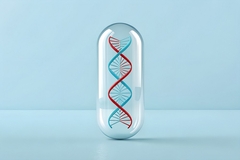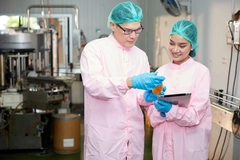MenaQ7 Natural Vitamin K2 Proclaimed GRAS

The panel conducted a critical review of extensive safety, toxicology and clinical research data obtained from animal and human testing, based on scientific procedures and safety assessment criteria established by the U.S. FDA.
06/02/08 NattoPharma, Norway, have received independent GRAS designation for MenaQ7 natural vitamin K2 as menaquine-7 for use as an ingredient in food products. MenaQ7 has been determined to be safe as a human food ingredient by an independent panel of recognized experts.
The panel conducted a critical review of extensive safety, toxicology and clinical research data obtained from animal and human testing, based on scientific procedures and safety assessment criteria established by the U.S. FDA.
"MenaQ7 is an extract of the fermented soy food called natto, providing a natural source of vitamin K2 as menaquinone-7," commented NattoPharma President Stein Westbye. "This evaluation further supports MenaQ7 as the only natural vitamin K2 product with proven safety and quality. In fact, MenaQ7 has been incorporated in baby foods in Korea since 1998. It is important that any ingredient incorporated in a food product first be demonstrated safe."
Paul Flowerman, President of PL Thomas added, "Natural vitamin K2 consumption has been shown to significantly support bone health and cardiovascular health as it is essential for the body to properly utilize calcium. In the Western diet, fermented cheeses are the best source of natural K2. Now, with self-affirmed GRAS status, MenaQ7 is the obvious choice for K2 enrichment in cheese and dairy products."
The authority to make novel GRAS determinations is provided by independent experts who are qualified evaluate the safety of food ingredients. NattoPharma and PL Thomas are also submitting the GRAS assessment document to the FDA for comment. Submission for extension of GRAS for uses beyond dairy applications is planned.
About Vitamin K2 The role of vitamin K2 has for the past decade been linked to two of the most important health issues, osteoporosis and cardiovascular disease. This link specifically centers on calcium utilization- implying that there is concurrent arterial calcification and osteoporosis when metabolism of calcium is inadequate. Vitamin K is essential to activate proteins involved in calcium metabolism.
Numerous population studies and interventional trials have established the consumption of vitamins K and K2 to bone strength, structure and the reduction of the risk of fracture. More recently, and specifically to vitamin K2, a significant role in cardiovascular health has been established.
A study published in the Journal of Nutrition called the "Rotterdam Study" in 2004, followed over 4,800 people for a ten year period. The study found increased intake of specifically vitamin K2 from dietary sources significantly reduced the risk of CHD mortality by 50% as compared to low dietary vitamin K2 intake. In this study, vitamin K1 had no effect at all.












